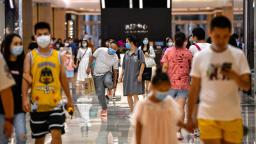
The world’s second largest economy has been in recovery mode for months. Now, consumers are starting to spend more, pushing retail sales up to 3.36 trillion yuan ($495 billion) in August, a 0.5% increase over the previous year. While small, the gain marks the first time sales have increased in 2020.
Chinese authorities touted the uptick at a monthly press conference Tuesday, and pointed out that the country is seeing economic improvement elsewhere, too.
“The job market has stabilized, and travel restrictions have loosened,” said Fu Linghui, a spokesman for National Bureau of Statistics. “People are more willing to come out and spend.”
China’s recovery makes it an outlier as the pandemic weighs on the rest of the globe.
Table Of Contents
Cautious recovery
China’s economy has been bouncing back since its $14 trillion economy shrank 6.8% in the first quarter, the worst plunge for a three-month period since China started publishing quarterly figures in 1992.
“Spending remains strongest among wealthier consumers, as evident from the continued rapid growth in car and property sales,” economists at Capital Economics wrote in a Tuesday research note, though they noticed that the data suggests the recovery is “broadening out.”
Signs of growth
Tuesday’s data revealed other positive signs. Industrial production and capital spending picked up in August, while the unemployment rate nudged slightly lower — 5.6% in August compared to 5.7% in July.
“This growth has brought some jobs back to the market,” said Iris Pang, chief economist for Greater China, in a research note.
“This is indeed the internal growth circulation that China is promoting,” she added, referring to Beijing’s recent focus on spurring domestic demand and trying to reduce its reliance on foreign trade, capital, and technology as tensions rise with the West.
Even Fu, the government spokesman, said Tuesday that the country still faces “big unemployment pressure” as a record number of new college graduates enter the job market. He said many of those people have had trouble finding a job because of the pandemic.